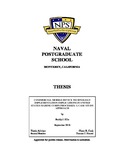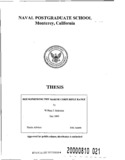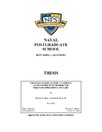Commercial mobile device technology implementation implications in United States Marine Corps processes: a case study approach
| dc.contributor.advisor | Cook, Glenn R. | |
| dc.contributor.author | Ellis, Buddy J. | |
| dc.date | Sep-16 | |
| dc.date.accessioned | 2016-11-02T17:18:26Z | |
| dc.date.available | 2016-11-02T17:18:26Z | |
| dc.date.issued | 2016-09 | |
| dc.identifier.uri | https://hdl.handle.net/10945/50536 | |
| dc.description.abstract | The United States Marine Corps is operating in an increasingly resource-limited and fiscally constrained environment while simultaneously becoming more dependent on information technology systems to efficiently train and operate. Balancing budget and mission requires innovative solutions to current problems. One such innovation that could potentially save the Marine Corps money, while increasing its ability to prepare for and conduct its mission, is the use of commercial mobile devices. This research used case study methodology to describe three processes that could benefit from the implementation of commercial mobile devices in the Marine Corps. Each independent case study was presented with three courses of action with implementation strategy variations. Socio-technical systems theory was used to analyze the intersection between the proposed new technology and the user. The technology acceptance model was used to analyze the likelihood of actual usage based on implementation strategy used. Finally, each course of action was analyzed with regard to confidentiality, integrity, and availability of organizational data. The conclusion of this research is that no one-size-fits-all implementation strategy of these devices will minimize risks and maximize benefits in all processes. This is likely due to the variations in confidentiality, integrity, and availability requirements of each process. | en_US |
| dc.description.uri | http://archive.org/details/commercialmobile1094550536 | |
| dc.publisher | Monterey, California: Naval Postgraduate School | en_US |
| dc.rights | This publication is a work of the U.S. Government as defined in Title 17, United States Code, Section 101. Copyright protection is not available for this work in the United States. | en_US |
| dc.title | Commercial mobile device technology implementation implications in United States Marine Corps processes: a case study approach | en_US |
| dc.type | Thesis | en_US |
| dc.contributor.secondreader | Housel, Thomas J. | |
| dc.contributor.department | Information Sciences (IS) | |
| dc.subject.author | commercial mobile device | en_US |
| dc.subject.author | bring your own device | en_US |
| dc.subject.author | BYOD | en_US |
| dc.subject.author | change management | en_US |
| dc.subject.author | application-based access | en_US |
| dc.subject.author | United States Marine Corps | en_US |
| dc.subject.author | USMC | en_US |
| dc.subject.author | confidentiality | en_US |
| dc.subject.author | integrity | en_US |
| dc.subject.author | availability | en_US |
| dc.subject.author | technology acceptance | en_US |
| dc.subject.author | sociotechnical systems theory | en_US |
| dc.description.service | Major, United States Marine Corps | en_US |
| etd.thesisdegree.name | Master of Science in Information Technology Management | en_US |
| etd.thesisdegree.level | Masters | en_US |
| etd.thesisdegree.discipline | Information Technology Management | en_US |
| etd.thesisdegree.grantor | Naval Postgraduate School | en_US |
| dc.description.distributionstatement | Approved for public release; distribution is unlimited. |
Files in this item
This item appears in the following Collection(s)
-
1. Thesis and Dissertation Collection, all items
Publicly releasable NPS Theses, Dissertations, MBA Professional Reports, Joint Applied Projects, Systems Engineering Project Reports and other NPS degree-earning written works.





